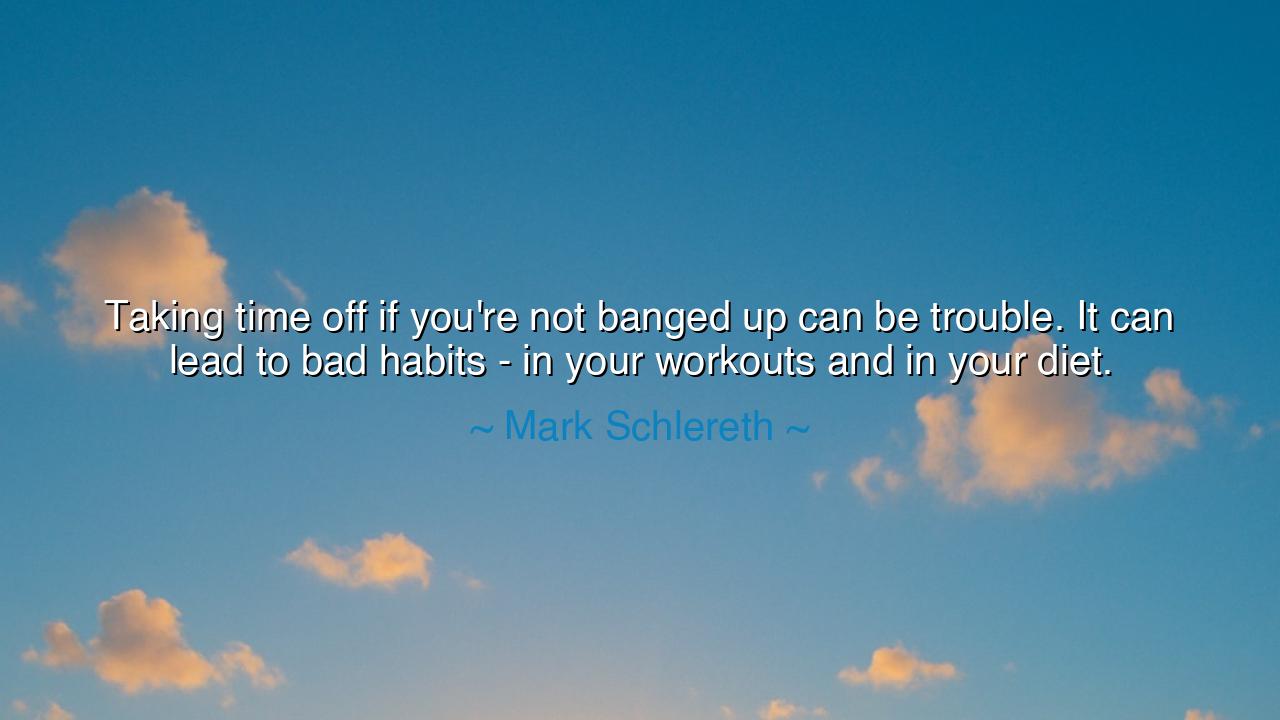
Taking time off if you're not banged up can be trouble. It can
Taking time off if you're not banged up can be trouble. It can lead to bad habits - in your workouts and in your diet.






In the words of Mark Schlereth, the warrior of the gridiron who bore the bruises of battle and the discipline of a soldier, there rings a warning forged from the fire of experience: “Taking time off if you're not banged up can be trouble. It can lead to bad habits—in your workouts and in your diet.” These words, though spoken in the tongue of sport, echo through the ages like the teachings of the ancients. They speak not only to the athlete, but to every soul who seeks mastery—of body, of mind, and of spirit. For Schlereth, whose life was a tapestry of sweat and endurance, understood the ancient law: discipline is a living flame, and if untended, it fades into ash.
The meaning of his words reaches beyond the field. To “take time off” without cause is to loosen one’s grip on the wheel of self-control. The body, when idle, hungers not for rest but for surrender. The mind, once sharp and watchful, begins to drift into softness, and soon the habits that built strength give way to comfort’s deceit. Bad habits, he warns, do not come with thunder—they come with whispers, with small choices, with the sweet lull of ease. Thus, his message is not of endless toil, but of vigilance—the eternal guard against the quiet erosion of the will.
The ancients understood this truth well. In the legends of Sparta, there was no room for idle luxury. The Spartan warrior trained not because war was constant, but because peace was fragile. They believed that to let the sword rust was to invite defeat before the battle even began. When the Persian envoys once mocked their simplicity and asked why they did not rest, a Spartan replied, “Because we would rather wear out than rust.” Mark Schlereth’s words carry this same fire. He reminds us that comfort, when unearned, can dull the very strength that once protected us.
And yet, there is a deeper wisdom in his warning. It is not rest itself that he condemns—it is aimless rest, the rest that becomes decay. For true rest is not absence of labor but the renewal of purpose. The wise warrior knows when to heal, and when to rise. But many mistake indulgence for recovery, and leisure for peace. Schlereth speaks against this confusion. His discipline was the discipline of the craftsman, who knows that a single day of neglect may undo a week of creation. To him, time off without need was not freedom—it was a slow betrayal of the self.
Consider the story of Marcus Aurelius, emperor of Rome and philosopher of endurance. Each morning he wrote to himself, reminding his own heart to rise to duty, even when the weight of empire pressed heavily upon him. He, too, could have chosen ease, for no man commanded more comfort than a Caesar. Yet he warned, “You were born to act, not to lie down.” Like Schlereth, he knew that strength is not given but maintained through constancy. The moment one yields to idleness, the empire within begins to crumble.
So too in our own lives, the same law holds true. When we delay the work, when we put off the effort, when we let the body rest too long or the mind wander too freely, we are not resting—we are surrendering. Habits are like rivers; they flow in the direction we carve them. Each day we train them, for good or for ill. The habit of strength must be practiced, or it will be replaced by the habit of weakness. Thus, Schlereth’s words are not about sport—they are about character. The man who cannot hold his discipline in quiet times will not summon it when storms come.
The lesson, then, is this: do not rest unless your wounds demand it. If you are not banged up, stay vigilant, stay sharp, stay in motion. Let your training—whether of body, craft, or spirit—be your daily ritual, your temple of perseverance. Rest only when rest renews you, not when it tempts you. For the path to greatness is not a sprint, nor a moment of glory, but a long march of constancy.
And so, to the seekers of strength and the builders of purpose, take heed: the world will always offer excuses for ease. But listen instead to the voice of endurance within you—the voice that whispers, “Do not rust.” For as Schlereth and the ancients alike would tell you, the fire of greatness is not kept alive by passion alone, but by the steady, humble, daily choice to keep going when you do not have to. That is the victory that outlasts all others.






AAdministratorAdministrator
Welcome, honored guests. Please leave a comment, we will respond soon